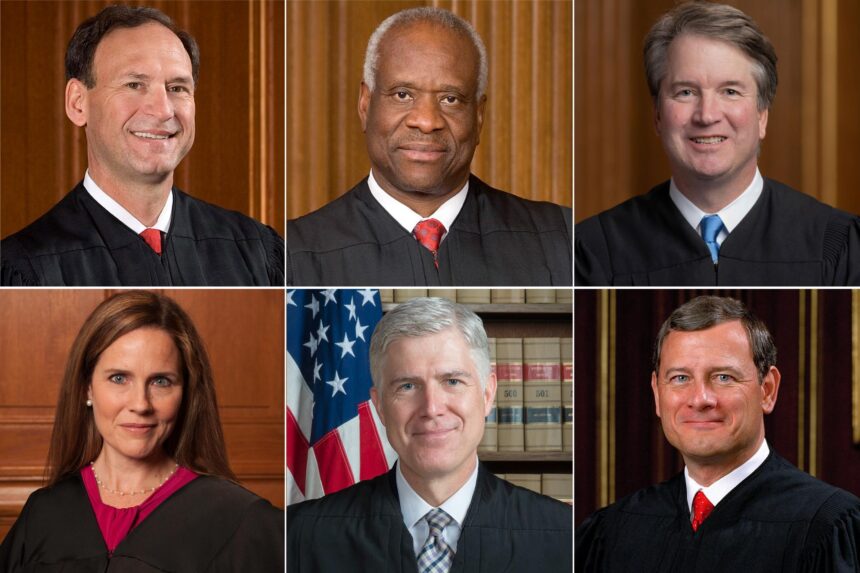Title: The Federalist Society: Influencing the Supreme Court for Future Generations
In the aftermath of significant Supreme Court rulings, a critical yet often overlooked entity in the legal arena comes into focus: the Federalist Society. Established in 1982, this conservative legal organization has emerged as a powerful player in shaping American law, particularly through its influence on judicial appointments and constitutional interpretation. Advocating for originalism and textualism, the Society has cultivated strong relationships with Republican administrations, creating a judiciary that may reflect its ideological stance for years to come. As contentious issues such as reproductive rights and gun legislation continue to unfold before the Supreme Court, the effects of the Federalist Society’s influence will resonate long after current justices have departed from their roles. This article delves into the historical development of this organization, its strategic involvement in judicial nominations, and its potential long-term consequences on America’s highest court.
The Federalist Society’s Role in Judicial Nominations and Legal Theory
The Federalist Society has solidified its position as a key influencer within American jurisprudence by advocating for a unique legal philosophy centered around originalism and textualism. At the heart of this movement lies an extensive network that connects conservative legal scholars, practitioners, and influential policymakers. In recent years, this organization’s impact has been especially notable regarding judicial nominations; members have played pivotal roles in evaluating candidates for both Supreme Court positions and lower courts. The influence exerted by the Federalist Society can be distilled into several core areas:
- Candidates Pipeline: The organization maintains an exclusive list of potential nominees who are committed to conservative judicial principles.
- Legal Scholarship: Leading figures within it advocate for philosophies emphasizing limited government intervention and individual liberties.
- Grassroots Engagement: The group effectively mobilizes grassroots support among conservative constituents to promote judicial conservatism.
This concerted initiative has led to a judiciary increasingly aligned with Federalist Society ideals—transforming American law’s landscape significantly. Their approach is rooted in interpreting constitutional text based on its original intent; thus far-reaching implications can be anticipated across various domains such as:
| Legal Domains | Plausible Outcomes |
|---|---|
| Political Donations | Easing restrictions surrounding campaign financing. |
| Healthcare Policy | Narrowing federal oversight over state healthcare systems. |
| Environmental Law | Diminishing regulatory barriers affecting industries. |
Long-Term Consequences of Conservative Judicial Philosophy on Social and Economic Policy
The ramifications stemming from conservative jurisprudence are expected to reverberate throughout American society over generations. Fundamental principles upheld by these justices—often grounded in strict constitutional interpretation—could drastically reshape critical areas including:
- Reproductive Rights: Heightened restrictions surrounding abortion access could adversely affect women’s health choices nationwide.
- Affirmative Action Policies: A potential rollback could limit educational opportunities for underrepresented communities.
- Labor Relations: Strengthening employer positions during labor disputes might weaken unions’ power leading to wage stagnation issues.
Additionally , economic policies emerging from such conservative interpretations may foster deregulation favoring large corporations while undermining consumer protections . For example , we might see key environmental safeguards rendered less enforceable if corporate interests take precedence . Hypothetical legislative changes could illustrate these shifts :
| Policy Area | Expected Impact | |||
|---|---|---|---|---|
| Corporate Oversight td > | Greater latitude granted corporations without stringent environmental regulations . td > tr > | |||
| Consumer Protections td > | (Limiting consumers ‘ ability )to seek recourse against harmful business practices . < / td > tr > | |||
| (Health Care ) < / td >< | (Privatization trends may hinder affordable care access )for low-income individuals . < / td > tr > tbody > table
Strategies To Challenge The Dominance Of The Federalists’ Influence In Legal DiscourseA variety strategies can be employed by progressive organizations , activists ,and legal scholars aiming at counteracting prevailing influences exerted bytheFederalistsocietyinlegal discourseandjurisprudence.Focusingonraisingpublicawarenessandpromotingalternativeperspectivesemphasizingindividualrights,socialjustice,and equalityarekeystepsconsiderednecessaryincluding : p>
|









